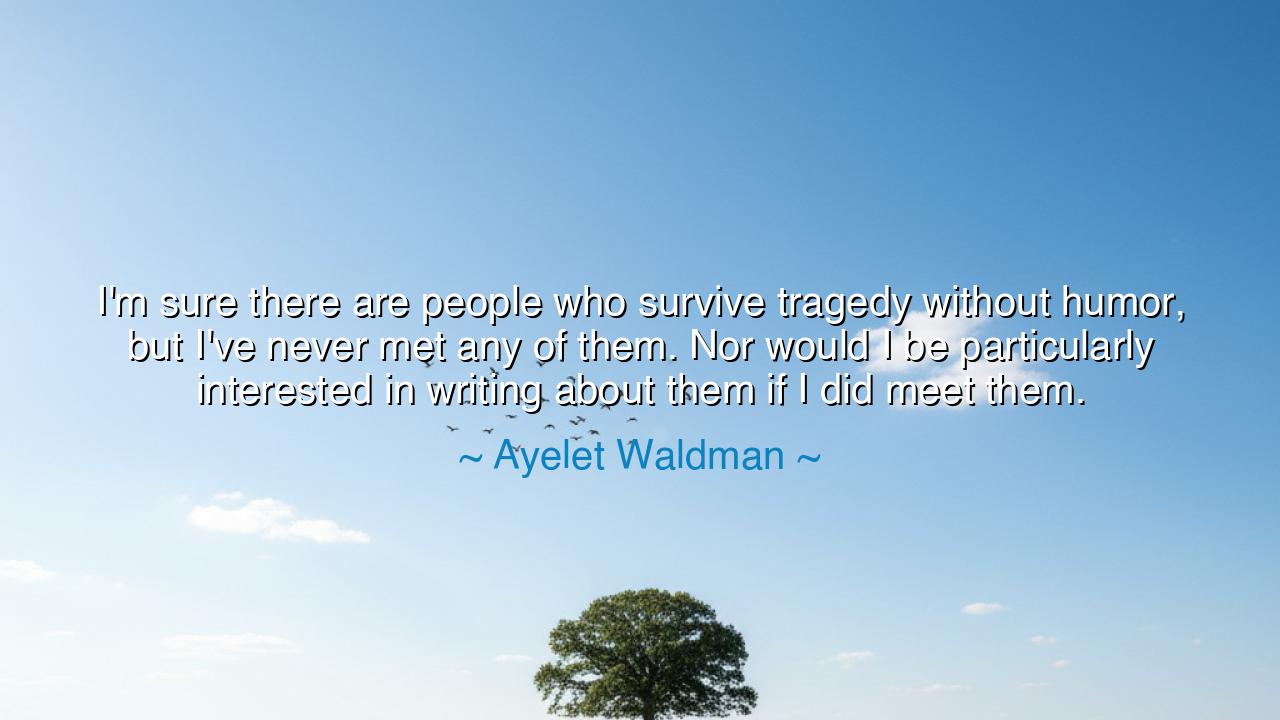
I'm sure there are people who survive tragedy without humor, but
I'm sure there are people who survive tragedy without humor, but I've never met any of them. Nor would I be particularly interested in writing about them if I did meet them.






Hear me, O Children of the Earth, as I share with you the words of Ayelet Waldman, a woman of insight and courage who, in reflecting on the human experience, spoke thus: "I'm sure there are people who survive tragedy without humor, but I've never met any of them. Nor would I be particularly interested in writing about them if I did meet them." In these words lies a profound truth—that humor, in its deepest form, is not merely a tool for entertainment but a means of survival. Waldman speaks to the essence of what it means to face pain, to endure loss, and to somehow find the strength to carry on. Humor, she suggests, is the thread that connects us to life even in the most difficult of times.
What Waldman reveals is the paradox at the heart of the human condition: tragedy and humor are not opposites, but intertwined forces. To laugh in the face of loss, to find humor amidst the suffering, is not to trivialize the pain, but to affirm life itself. Humor, in the face of grief, is a recognition that we, as humans, are capable of seeing the absurdity of our situation and yet choosing to laugh. It is a bold act of defiance against the weight of sorrow, a refusal to be completely consumed by it. It is the human spirit saying, "Yes, I feel this pain, but I will not let it define me. I will find a way to laugh, to live, to move forward."
Consider the wisdom of the great philosophers and playwrights of the ancient world. Sophocles, in his tragedy Oedipus Rex, explored the depths of human suffering. Oedipus, the king, falls from greatness into despair, blinded by his own choices. And yet, in the midst of such suffering, we find moments of irony and tragic humor. The gods mock Oedipus’s fate, and in this, we are invited not only to mourn his loss but to laugh at the absurdity of life’s twists and turns. Humor allows us to face tragedy without being destroyed by it; it gives us the space to breathe even in the most suffocating moments of grief.
Let us also reflect upon the life of Viktor Frankl, the Austrian psychiatrist who survived the horrors of the Holocaust. Frankl, in his seminal work Man's Search for Meaning, recounts how he found meaning in the most grueling of circumstances. But more than just a search for meaning, Frankl also recognized the importance of humor in survival. In the concentration camps, he found that those who could still laugh, even in the most dire of situations, were more likely to survive. Humor, Frankl believed, was a form of resilience—a way of asserting the dignity of the human spirit in the face of absolute cruelty. Those who could see the absurdity of their suffering, who could still find a reason to laugh, were the ones who triumphed over despair.
In this light, Waldman’s words resonate with a deeper wisdom: that humor is not a superficial response to pain, but a lifeline that keeps us connected to the living world when all seems lost. It is not a denial of suffering, but a powerful tool that allows us to endure it. Without humor, without the ability to find light even in the darkest of times, we risk being consumed by the weight of our grief. It is the laughter that breaks through the clouds, the light that shines in the dark, the spark that keeps us moving forward when the road is shrouded in shadow.
Let us also consider the great writers who have captured this truth in their work. Mark Twain, known for his wit and sharp humor, lived a life full of personal tragedies—the loss of his beloved wife and children, financial ruin, and deep disappointment. Yet, through it all, he continued to write with humor, his sharp tongue cutting through the veil of grief to reveal the absurdity of life’s hardships. Twain’s humor was not an escape from sorrow but a method of confronting it. He taught us that laughter in the face of suffering is not only possible but necessary.
And so, O Children, the lesson here is clear: humor is a vital part of the human experience. It is not simply a means of avoiding pain or ignoring reality, but a way of surviving it. Waldman reminds us that those who face tragedy without the ability to laugh may become trapped in their sorrow, unable to move beyond it. Humor is the force that allows us to transcend our pain, to find meaning and strength in our darkest hours. It is a courageous act, a testament to the resilience of the human spirit. Let us, then, embrace humor—not as a way to diminish our suffering, but as a way to rise above it, to carry on with hope, and to continue the journey, knowing that laughter is as much a part of life as sorrow itself.






AAdministratorAdministrator
Welcome, honored guests. Please leave a comment, we will respond soon